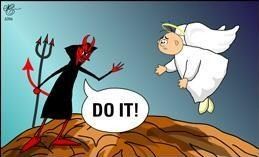
(Image: carlsencards.com)
I may have been predestined to write this.
There is a new paper this week by John Conway and Simon Kochen that reconsiders what physics has to tell us about free will.
I've written about an earlier version of Conway and Kochen's "Free Will Theorem" in the past, for New Scientist magazine. This, of course, predisposes me towards covering the mathematicians' new thoughts on the subject. But at a deeper level, do I have any real choice about whether not or not I write this? Or am I inevitably driven to do so by chemical reactions in my brain that were predetermined to occur via a long causal chain of reactions set up billions of years ago by the peculiar way that the particles were created after the Big Bang? It's this deeper question that Conway and Kochen tackle.
For them, the answer is no, my actions are not predetermined. Their theorem, which was originally set out in 2006, purports to be the first logical proof demonstrating that if humans have free will, then the laws that govern the behaviour of subatomic particles cannot be deterministic. That's not a problem for Conway and Kochen, since standard interpretations of quantum mechanics happily embrace indeterminism. Before measurement, conventional wisdom goes, a quantum particle exists in a superposition of many mutually contradictory states; only after measurement does the particle settle into one of these options. Prior to measurement it is impossible to know for certain what the outcome of the measurement will be. That indeterminacy is good news, say Conway and Kochen. It means that free will survives.
But what if this standard interpretation of quantum mechanics is wrong and the world is governed by deterministic laws? There are physicists who are currently investigating this possibility, for example, FQXi's Antony Valentini of Imperial College London, who is looking into whether the random outcomes of quantum experiments are determined in advance by "hidden variables"--subatomic blueprints to which we do not currently have access.
If a hidden-variables theory is correct, then Conway and Kochen's theorem tells us that we cannot truly have free will. The thought was so alarming that it caused Nobel Laureate Gerard 't Hooft, who is developing his own deterministic theory, to attempt to redefine "free will" in a way that isn't in conflict with determinism.

(Image: Frank Foreman)
Conway and Kochen's proof is based on the ways that you can poke a particle to determine the value of its spin along a certain axis. Measuring a particle's spin is a lot like playing the game "twenty questions", where one player tries to guess what their opponent is thinking of by asking them yes/no questions. If you play honestly, you think of an object before the game starts and stick with it. This corresponds to a deterministic theory--a particle has definite predetermined spin values before you look at it, and when you probe it along three axes, it simply yields these set values.
The crux of the proof rests on the fact that if you measure the square of the spin of so-called "spin 1" particles along three perpendicular axes, you always uncover the same three values--1,0,1--in various orders. Just over 40 years ago, Kochen and his colleague Ernst Specker showed that with this restriction in place, it's impossible for the particle to have consistently defined spins along every direction you might choose to measure, before the game begins. Even if you just look at 33 possible directions, the particle can't set spin values along each of the 33 direction such that you get you 1, 0, 1, no matter which three perpendicular directions you choose to poke. You can set consistent spins for 30 directions, but the final three must paradoxically be both 1 and 0.
That's fine for quantum mechanics, where the particle sets its spin on-the-fly. This corresponds to cheating at "twenty questions", where you can keep changing the object in mind, as the questions are being asked.
But if we want a deterministic theory to hold, there seems to be only one way to avoid hitting a paradox. Nature must somehow restrict the experimenter's choice, so that she only chooses to measure along three axes chosen from the 30 directions along which spin is completely defined. But, if that's the case, Conway and Kochen argue, then she cannot have had the free will to set up her experiment as she desired; her choice wasn't under her control, but predetermined by nature to stop her from running into the paradox.
Conclusion: If the experimenter is truly free to choose the directions along which to make her measurement, then the particle's response cannot have been predetermined.
Some have argued that certain deterministic theories could still survive the free-will trap. For example, there may be more complicated ways of setting spin values, in which the measurement order influences the values of spin returned upon measurement. Although Conway and Kochen addressed this point in their original theorem, they have now tightened their axioms in an attempt to close this loophole completely.
It will be interesting to see if Conway and Kochen have been successful in setting all deterministic theories up against free will. But even if they succeed, is quantum indeterminism really the saviour free will? It may be true that it saves us from simply playing out a predetermined destiny, planned out in advance in a clockwork universe. But in what sense do we have control over our choices in this quantum world? Are we simply replacing a predetermined future over which we have no control, with a future based on random quantum outcomes, again, over which we have no control? Quantum mechanics may *free* us from a future that was set in stone billions of years ago, but it still cannot explain the origin of the *will* that allows us to make choices.